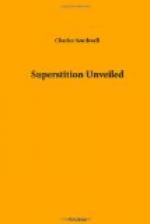Now, a Revelation from God might reasonably be expected to make the mode and nature of His existence manifest. But the Christian Bible falls infinitely short in this particular. It teaches there is a God; but throws no light on the dark question What is God? Numerous and various as are Scripture texts, none can be cited in explanation of a Deity no older to-day than he was yesterday, nor younger to-day than he will be to-morrow; of a Deity who has no relation to space, not being a part here and a part there, or a whole any where: in short, of that Deity written about by Bishop Watson, who, like every other sincere Christian, made the mistake of resting his religious faith on ’words without knowledge.’
It is to this description of faith Universalists object. They think it the root of superstition, that greatest of all the plagues by which poor humanity is afflicted. Are they to blame for thus thinking? The Christian has no mercy on the superstition of the Heathen, and should scorn to complain when the bitter chalice is returned to his own lips. Universalists believe the God of Bishop Watson a supernatural chimera, and to its worshippers have a perfect right to say, Not one of you reflects that you ought to know your Gods before you worship them. These remarkable words, originally addressed to the Heathen, lose none of their force when directed against the Christian.
No one can conceive a supernatural Being, and what none can conceive none ought to worship, or even assert the existence of. Who worships a something of which he knows nothing is an idolater. To talk of, or bow down to it, is nonsensical; to pretend affection for it, is worse than nonsensical. Such conduct, however pious, involves the rankest hypocrisy; the meanest and most odious species of idolatry; for labouring to destroy which the Universalist is called ’murderer of the human soul,’ ‘blasphemer,’ and other foolish names, too numerous to mention.
It would be well for all parties, if those who raise against us the cry of ‘blasphemy,’ were made to perceive that ‘godless’ unbelievers cannot be blasphemers; for, as contended by Lord Brougham in his Life of Voltaire, blasphemy implies belief; and, therefore, Universalists cannot logically or justly be said to blaspheme him. The blasphemer, properly so called, is he who imagines Deity, an ascribes to the idol of his own brain all manner of folly, contradiction, inconsistency, and wickedness.
Superstition is universally abhorred, but no one believes himself superstitious. There never was a religionist who believed his own religion mere superstition. All shrink indignantly from the charge of being superstitious; while all raise temples to, and bow down, before ‘thingless names.’ The ‘masses’ of every nation erect chimera into substantial reality, and woe to these who follow not the insane example. The consequences—the fatal consequences—are everywhere apparent. In our own country we see social disunion on the grandest possible scale. Society is split up into an almost infinite variety of sects whose members imagine themselves patented to think truth and never to be wrong in the enunciation of it.




